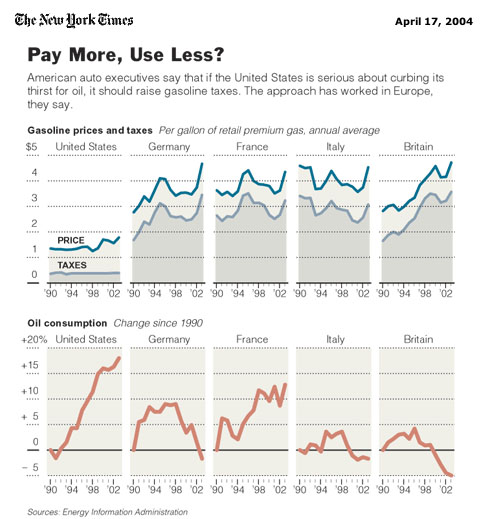![]()
Consumer psychology sheds insight on voter psychology. Without deliberation, voting more nearly resembles a solitary consumer experience, where the drive for personal satisfaction is a primary drive. As is shown in much of political science, economics, and psychology, the pursuit of temporary satisfaction is not necessarily a rational pursuit.
With deliberation, a person becomes engaged in the issues, and engages in dialogue with others of different views. It's not so much that a person might move towards one or another set of new views as result of this type of deliberation, as the fact that a different process of thinking might be in place.
Why does the vitality of American democracy matter?
Or, to look at this question another way -- how do democracies make decisions? To pick a recurring discussion that illustrates the bind resulting when citizens are not engaged in a public dialogue, we can look at the controversy in campaign commercials from this past spring about taxing gasoline. A paradox of US politics is that the idea of a gas tax can be used as a weapon in ads to attack a candidate, yet experts from the auto industry and the oil industry, economists and environmentalists all agree that it is among the best approaches to good energy policy.
It is also among the successful approaches chosen by Europe, where energy conservation is a priority well understood by the public. (See charts below.)
As quoted in the New York Times, April 18:
"Anything that can align the individual customer's purchase decisions with society's goals are the way to go," Ford's chairman and chief executive, William Clay Ford Jr., said, adding that his company has previously supported a 50-cent increase in gas taxes.
(The current federal gas tax is 18.4 cents, and state taxes vary. All told, taxes account for about 24 percent of the cost of a gallon of gasoline.)
Mr. Ford said the current regulatory system, which compels automakers to make cars and trucks that meet minimum standards for fuel efficiency, "puts the manufacturer in this tug of war that's unsustainable between what the customer wants and what society says it wants." [Full article here.]
What Ford is saying, if put into more blunt terms, is that corporations can't govern, and consumers can't govern. In a democracy, citizens are meant to govern, ultimately, by making choices. In order for citizens to not make irrational or contradictory choices -- "I want cheap gas, I want to drive an SUV, and I also want to conserve energy and make the country less dependent on foreign oil" -- citizens have to address the realities of a situation, and resolve the issues in their own minds. The collective understanding and the collective will of citizens is the underlying social contract that makes government possible, and it is what makes a rational governing choice like a tax on gasoline possible.
The question for inhabitants of a democracy then becomes -- what are the conditions in which an objective reality is best encountered by the public? What are the conditions that produce effective citizenship?
A theme of this project is to investigate how information travels in a large consumer-driven society...and what the best conditions for encouraging informed citizenship might be.

Clotaire Rapaille and the Reptilian Brain